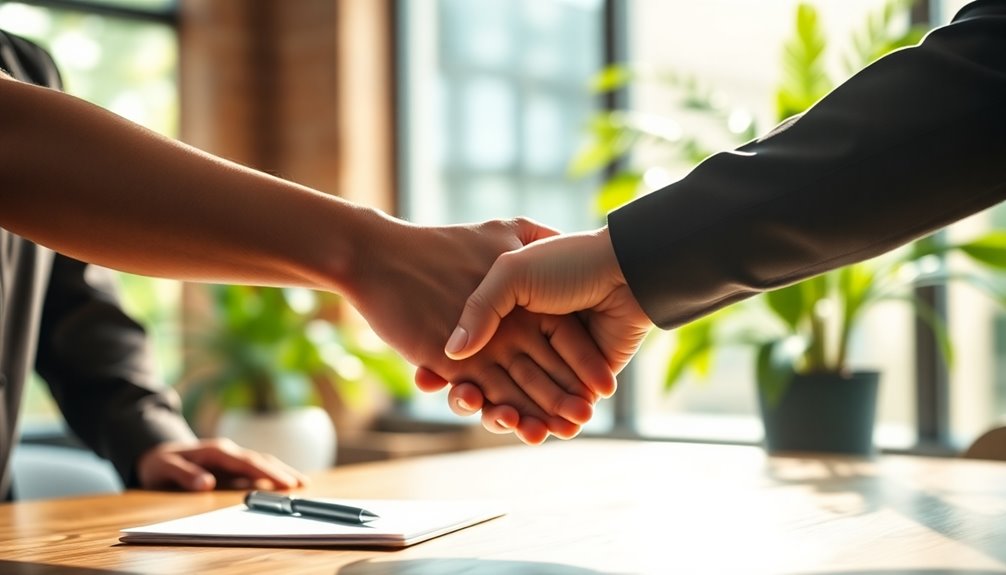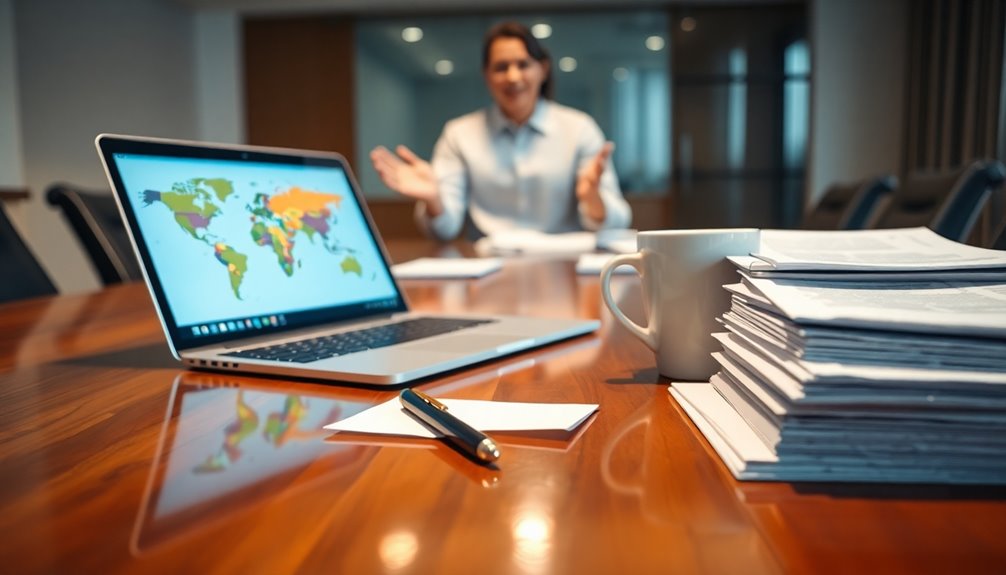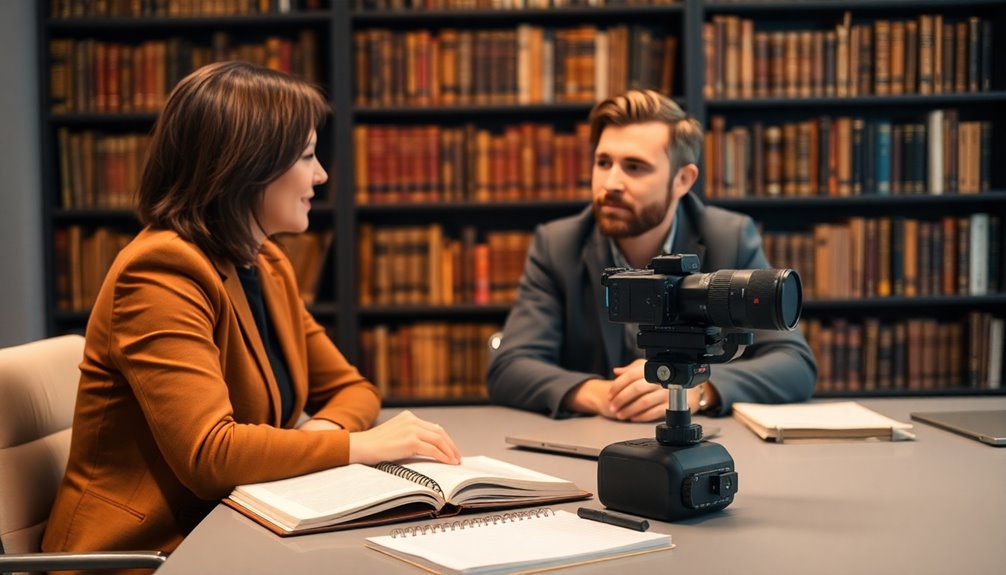You'll know you're likely to get hired after your interview when you catch those seven secret signs. If interviewers lean in and maintain good eye contact, it shows they're engaged. Positive feedback or specific praise means they see you as a fit. Encountering casual conversations about the job or introductions to team members indicates a good vibe. If they discuss company culture and future steps, you're on the right track. Quick follow-ups suggest they're interested in you. Pay attention to these signs, and you might just secure that offer! There's even more insight to uncover.
Key Takeaways
- Positive Body Language from Interviewers: Engaged smiles and nods suggest they are receptive and comfortable with you as a candidate.
- Casual Conversations: Personal discussions about company culture indicate they see you as a potential fit within the team.
- Meeting Multiple Team Members: Introduction to various team members reflects serious consideration for your role in the organization.
- Discussion of Role Details: Conversations about specific job responsibilities signal genuine interest in your potential contributions.
- Timely Follow-Up: A prompt response from the employer shows strong interest and enhances your chances of receiving an offer.
Positive Nonverbal Cues

Positive nonverbal cues play an essential role in how you're perceived during an interview. Maintaining good posture is vital; it conveys confidence and professionalism. Open body language, like uncrossed arms and legs, shows you're approachable and authoritative. Leaning forward during the conversation indicates genuine interest and engagement, making you more memorable to the interviewer. Additionally, employing audience engagement strategies can enhance your interaction during the interview.
Your facial expressions and eye contact are equally important. Steady eye contact establishes rapport and signals that you're attentive. A smile, when appropriate, portrays warmth and friendliness, while nodding and slight head movements demonstrate your engagement in the discussion. Remember to blink naturally to avoid an intense stare.
A firm handshake sets a positive tone right from the start. Arriving on time and greeting everyone with respect reflects your confidence and poise. When meeting the interviewer, stand up, introduce yourself confidently, and combine your handshake with a smile to show approachability.
Throughout the interview, stay responsive with nonverbal cues like nodding or leaning in to indicate attentiveness. Effective nonverbal communication can alleviate any interview anxiety, allowing you to present your best self. Avoid distractions, and show enthusiasm through your expressions.
These positive nonverbal signals can greatly boost your chances of making a lasting impression.
Casual and Personal Interactions

Engaging in casual and personal interactions during an interview can signal that you're a strong candidate. When the conversation shifts from your qualifications to more casual topics, it indicates that the interviewer is satisfied with your skills and experience.
This relaxed atmosphere not only helps them get to know you better but also allows you to provide more authentic answers. Here are some signs that these interactions are going well:
- Introduction to Team Members: If you're introduced to other team members, it shows they see you as a good fit for the team.
- Casual Conversation: The interviewer discusses general topics or company culture, which can help you gauge your fit within the organization.
- Discussion of Company and Role Details: When they share specifics about the company and role, it's a sign they're seriously considering you. This aligns with the idea that casual interviews encourage a relaxed atmosphere for better connection.
- Focus on Future Steps: If the interviewer asks about your availability or discusses next steps, it indicates genuine interest in bringing you on board.
These interactions can help you feel more connected to the team and demonstrate that the company values your potential.
Specific Compliments and Feedback

During an interview, receiving specific compliments and feedback can be a strong indicator of your potential to get hired. If the interviewer says things like, "That's exactly what we're looking for," or praises your project management experience, it shows they see your fit for the role. Positive verbal cues, such as "I was impressed by…" indicate genuine interest in your responses.
Moreover, if they recognize your unique skills or attention to detail, it's a promising sign. Acknowledgment of your hard work, like "Your efforts lately haven't gone unnoticed," suggests they value your contributions. Regular compliments can enhance employee morale and reflect the company's culture of appreciation.
When the interviewer leans forward, maintains eye contact, and smiles, they're likely engaged and approving of what you bring to the table. Comments about cultural fit, such as "You'd be a great addition to the team," further highlight their interest.
If they discuss how your skills will contribute to future projects, it's a clear indication they envision you in the role. Overall, specific compliments and constructive feedback during your interview can cement your status as a top candidate, setting you up for success in the hiring process.
Discussion of Job Details

When you're in an interview, discussing job details is essential for both you and the employer. This conversation helps you understand the role and guarantees that the company aligns with your expectations.
Here are four key areas to focus on during this discussion:
- Understanding the Role: Ask about the core responsibilities and daily duties. Get clarity on how the position might evolve over time and who you'll be working with. Additionally, it's important to ensure your qualifications align with the job specification to highlight your fit for the role.
- Company Culture and Environment: Observe employee interactions and dress code. Inquire about the company culture, typical work schedules, and the leader to whom you'll report.
- Benefits and Perks: Discuss vacation time, free snacks, and company events. Compare these benefits to industry standards to assess their overall value.
- Next Steps and Follow-Up: Clarify the hiring process's next stages, including skills tests or additional interviews. Make sure you know how to follow up with the hiring manager.
Interaction With Multiple People

When you meet multiple team members during an interview, it's a strong sign they're interested in you. Establishing positive rapport with different individuals not only shows your compatibility but also indicates the company values your potential fit. These interactions can provide you valuable insights into the team dynamics and culture. Engaging with various team members can also reflect the company's commitment to collaborative hiring, ensuring a well-rounded evaluation of your suitability for the role.
Meeting Team Members
Meeting multiple team members throughout the interview process is a strong indicator that you're being seriously considered for the position. Engaging with different individuals means the company is conducting a thorough evaluation of your fit within the team.
Here are a few reasons why this is a positive sign:
- Multiple Stages of Interviews: Progressing through various interview stages shows you're a top contender.
- Diverse Assessments: Each team member assesses different aspects of your skills and personality, ensuring a well-rounded evaluation.
- Team Dynamics: Meeting multiple members helps the company gauge how you'll fit into their existing team dynamics. Additionally, it reflects the importance of team preparation in making a collective decision.
- Culture Insight: This interaction allows you to evaluate the company culture, giving you a clearer picture of your potential work environment.
These meetings not only demonstrate the hiring manager's confidence in your abilities but also provide you with valuable insights into the team you may join.
Positive Rapport Established
Establishing positive rapport with interviewers can considerably enhance your chances of getting hired. When multiple interviewers smile and nod in agreement, it indicates they're engaged and receptive to your responses. Maintaining eye contact and leaning in during the conversation shows your interest, while positive body language from them reflects their comfort with you. Furthermore, engaging in unconditional love during the interaction can create a supportive atmosphere that fosters mutual respect.
If the conversation shifts from qualifications to casual topics, that's a good sign; it means they're satisfied with your qualifications and want to get to know you better. A natural flow of conversation indicates that they feel at ease and open to further discussions. It's important to note that 70% of candidates appreciate personalized communication, which can further strengthen your connection.
Listen for verbal indicators, too. If they use phrases like "when" instead of "if," it suggests they believe you'll fit into the team. Positive comments about your background, along with discussions regarding the company's benefits, signal they're considering you for the role.
Finally, if they discuss follow-up processes or ask about your availability for the next interview, it's a clear sign of interest. Handing out business cards also reflects their desire to keep the communication lines open, further solidifying a positive rapport.
Follow-Up and Communication

After an interview, your follow-up timing can make a significant difference in how you're perceived. Responding quickly shows your enthusiasm, while a warm communication tone helps you connect with the interviewer. Keeping it personal and professional reinforces your interest in the position. Sending a follow-up email within 24 hours can demonstrate your eagerness and respect for the interviewer's time.
Quick Response Time
A swift response time during the hiring process can greatly enhance your chances of landing the job. When employers take the time to reply quickly, it shows they respect your effort and time. This creates a positive candidate experience, keeping you engaged and interested in the opportunity.
Here are some key reasons why quick response times matter:
- Increased Engagement: Quick follow-ups keep you invested and discourage you from exploring other offers.
- Positive Impressions: A rapid response to your thank-you email indicates you made a great impression during the interview.
- Next Steps: If recruiters contact you promptly to discuss the next steps, it signifies they're enthusiastic to secure your candidacy.
- Streamlined Process: Fast responses create a more efficient hiring process, allowing employers to focus on great candidates before they accept other offers. Quick response times also help ensure that candidates remain engaged, as candidates are 250% more likely to convert to hires with responses within 2 days.
When you notice quick communication from a potential employer, take it as a strong sign that you're on their radar.
In today's competitive job market, responsiveness can be a game-changer for securing top talent like you!
Warm Communication Tone
Engaging in a warm communication tone during your interview can markedly boost your chances of getting hired. When you actively listen, show genuine interest, and use non-verbal cues like nods and smiles, you create a connection that interviewers appreciate. Follow up with insightful questions based on their responses and maintain eye contact to convey your attentiveness. Additionally, active listening is crucial as it encourages dialogue and deeper engagement, which can significantly enhance the overall interview experience. Moreover, being aware of small mistakes you might make during the interview can help you focus on your strengths and improve your chances of success.
Building rapport is also essential. Share personal anecdotes that relate to the conversation, fostering a sense of camaraderie. When you express genuine excitement about the role and the interviewer's insights, it leaves a lasting impression.
Here's a quick look at how a warm communication tone can manifest during your interview:
| Aspect | What to Do | Emotional Impact |
|---|---|---|
| Active Listening | Nod, smile, and engage with questions | Shows you care about the conversation |
| Building Rapport | Share related stories | Creates a personal connection |
| Positive Feedback | Compliment their insights | Makes them feel valued and recognized |
Signs of Team Fit

Finding the right team fit can make all the difference in your job satisfaction and success. During the interview, look for signs that suggest you align well with the team's culture and dynamics.
Here are four key indicators to watch for:
- Casual Conversations: If the interview shifts from formal questions to more casual talk, it's a good sign that the interviewer sees you as a potential team member.
- Introductions to Team Members: Meeting future co-workers during your interview shows they're considering how well you'll mesh with the team. This interaction can also reflect their commitment to fostering a positive environment, similar to how socialization is vital for puppies.
- Positive Body Language: Look for signs like the interviewer leaning forward or using language that implies your future role, such as "when you work here."
- Discussion of Work Environment: If you discuss your ideal work atmosphere and how it aligns with the company's culture, it indicates they're evaluating your fit within their team. Culture fit is crucial for fostering team collaboration and job satisfaction, so ensure your values align with theirs.
When you notice these signs, it's a strong indication that you're on the right track to becoming part of their team!
Frequently Asked Questions
What Should I Wear to the Interview for a Good Impression?
To make a great impression at your interview, you should wear professional attire.
Opt for a dark-colored suit with a solid-color dress shirt and tie, or a skirt suit if you prefer. Stick to neutral colors and conservative footwear. Confirm your clothes are clean, ironed, and fit well.
Pay attention to grooming—neat hair, clean-shaven face, and well-manicured nails show you care. Simple accessories can enhance your look without overwhelming it.
How Can I Prepare for Common Interview Questions Effectively?
Picture a knight preparing for battle; you need to arm yourself with knowledge. To tackle common interview questions effectively, start by anticipating them.
Craft concise answers, using the STAR method to showcase your experiences. Practice your responses aloud, refining your tone and body language.
Rehearsing with friends builds confidence and sharpens your delivery. Remember, you're not just answering questions; you're telling your story, making your mark in the professional domain.
What Should I Bring to the Interview Besides My Resume?
When preparing for your interview, you should bring several important items besides your resume.
Pack multiple copies of your references, a pen and notepad for taking notes, and any work samples or a professional portfolio.
Don't forget cash for parking or directions to the interview site.
Having pre-written questions for the interviewer and notes on the company can help you stand out and demonstrate your preparation and enthusiasm.
How Do I Handle Unexpected Questions During the Interview?
When you face unexpected questions during an interview, stay calm and take a moment to collect your thoughts.
Don't hesitate to ask the interviewer to clarify if needed. Focus on the question, keeping your response relevant to the job role.
Use a structured approach, such as the Situation-Problem-Solution framework, to organize your answer.
If you're unsure, be honest about it and express your willingness to follow up later.
What Is the Best Way to Follow up After the Interview?
You might think following up after an interview feels awkward, but it's an essential step.
Start by introducing yourself clearly, mentioning the job title and interview date. Reference specific topics from your discussion to jog the hiring manager's memory.
Express gratitude for their time and reiterate your interest in the position.
Finally, politely ask about the hiring timeline. A thoughtful follow-up can keep you fresh in their mind and show your enthusiasm.
Conclusion
Just like a seed sprouting towards the sun, if you notice these signs after your interview, you're likely on the path to success. Positive nonverbal cues, personal interactions, and enthusiastic discussions about the job are all good indicators. If you felt a connection with multiple team members, that's even better! Trust your instincts, follow up promptly, and stay engaged. With these signs in your favor, you might just be one step closer to landing that dream job!









